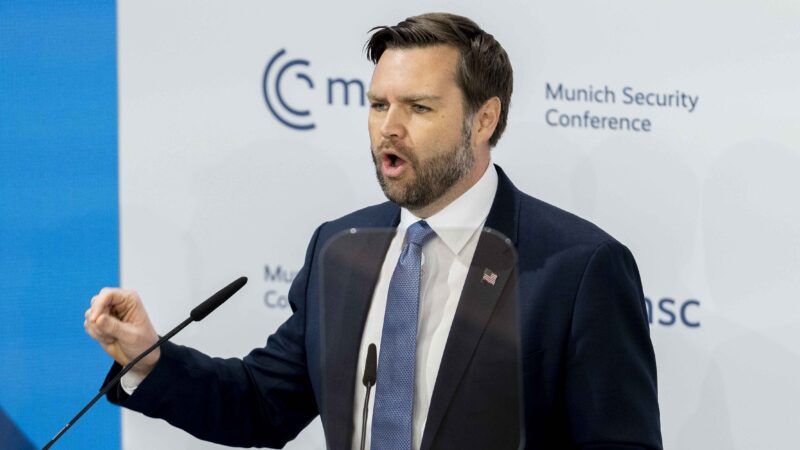J.D. Vance Brings the Culture War to Europe: 'There Is a New Sheriff in Town'
The Munich Security Conference was supposed to be a foreign policy forum. Instead, the vice president lectured Europeans about democracy.

The Munich Security Conference in Germany this weekend was supposed to host the opening salvo of the Trump administration's peace initiative for Ukraine. But Vice President J.D. Vance dedicated only a few words of his Munich speech on Friday to the war there: "The Trump administration is very concerned with European security and believes that we can come to a reasonable settlement between Russia and Ukraine."
Instead, Vance's speech brought America's domestic culture war to the global stage. "The threat that I worry the most about vis-à-vis Europe is not Russia, it's not China, it's not any other external actor," he said. "What I worry about is the threat from within: the retreat of Europe from some of its most fundamental values, values shared with the United States of America."
It's a strange mirror of the Biden administration, which tried to tie its foreign policy to its domestic agenda. Former President Joe Biden began his administration promising a "foreign policy for the middle class" and a global alliance of democracies, with Europe as the centerpiece. The Trump administration is similarly kicking off its foreign policy agenda with a lecture to Europe about democracy—but in favor of conservative rather than progressive values.
Vance framed his address as a defense of free speech. "In Washington, there is a new sheriff in town. And under Donald Trump's leadership, we may disagree with your views, but we will fight to defend your right to offer them in the public square," Vance said. He cited some egregious violations, including a Romanian election that was annulled over Russian interference conspiracy theories, a British man who was convicted of silently praying outside an abortion clinic, and a Swedish man convicted of burning the Quran.
"Sometimes the loudest voices for censorship have come not from within Europe, but from within my own country, where the prior administration threatened and bullied social media companies to censor so-called misinformation," Vance added, citing the suppression of the COVID-19 lab-leak theory.
Still, the speech wasn't about taking a hands-off approach to other countries' politics; Vance was clearly endorsing the European right, particularly its anti-immigration politics. "Of all the pressing challenges that the nations represented here face, I believe there is nothing more urgent than mass migration," he said. "No voter on this continent went to the ballot box to open the floodgates to millions of unvetted immigrants…More and more all over Europe, they are voting for political leaders who promise to put an end to out-of-control migration." He mentioned yesterday's car ramming attack in Munich by an Afghan refugee.
And Vance told Germans not to get too annoyed with Trump administration adviser Elon Musk's commentary on their elections. Musk has been loudly supporting the right-wing Alternative for Germany in upcoming elections. The current front-runner, the center-right Christian Democratic Union, has called Musk's comments an inappropriate foreign intervention and threatened to retaliate against his businesses.
"Speaking up and expressing opinions isn't election interference," Vance said. "Even when people express views outside your own country, and even when those people are very influential—and trust me, I say this with all humor—if American democracy can survive 10 years of Greta Thunberg's scolding, you guys can survive a few months of Elon Musk."
For all its criticisms of Democrats' and neoconservatives' foreign adventurism, the "America First" movement turns out to have plenty of crusades it wants to pursue abroad. Of course, scolding allies from the bully pulpit is a lot less destructive than waging a hot war. Then again, the Biden administration didn't start off wanting a fight in Ukraine and Gaza, either.
"For years we've been told that everything we fund and support is in the name of our shared democratic values. Everything from our Ukraine policy to digital censorship is billed as a defense of democracy," Vance said. If he's not careful, his own "shared values" might turn into an excuse for conflict.
European Union High Representative for Foreign Affairs and Security Policy Kaja Kallas certainly took it that way. "Listening to that speech, they try to pick a fight with us," she said at the Munich conference. "And we don't want to a pick a fight with our friends."


Show Comments (165)